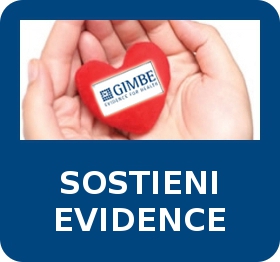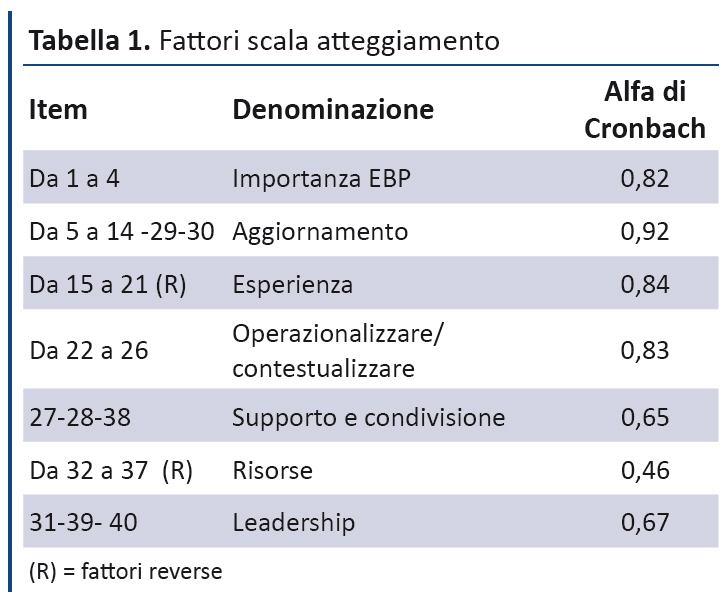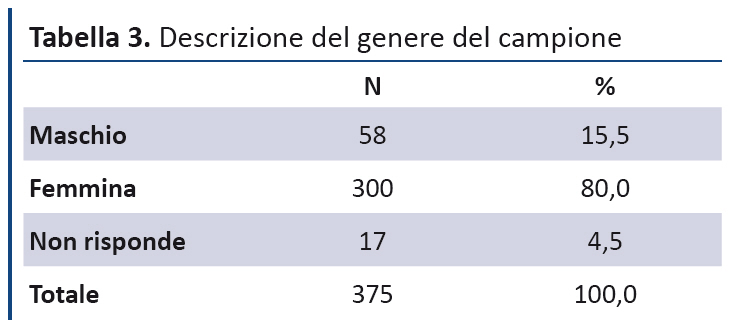Evidence-based practice del rischio infettivo: conoscenze, percezione ed atteggiamenti degli infermieri. Studio osservazionale multicentrico
Ricerca originale
Evidence-based practice del rischio infettivo: conoscenze, percezione ed atteggiamenti degli infermieri. Studio osservazionale multicentrico
Alvisi Sabrina, Bellomo Pamela, Fabbri Elisa, Gambaretto Carlo, Lucaci Oana Alina, Mariani Laura, Patera Fabrizio, Sinisgalli Angela, Sollami AlfonsoEvidence 2020;12(5): e1000209 doi: 10.4470/E1000209
Pubblicato: 28 luglio 2020
Copyright: © 2020 Alvisi et al. Questo è un articolo open-access, distribuito con licenza Creative Commons Attribution, che ne consente lâutilizzo, la distribuzione e la riproduzione su qualsiasi supporto esclusivamente per fini non commerciali, a condizione di riportare sempre autore e citazione originale.
1. Panczyk M, Belowska J, Zarzeka A, Samolinski L, Zmuda-Trzebiatowska H, Gotlib J Validation study of the Polish version of the evidence-based practice profile questionnaire. Med Educ, 2017; 17.1: 38.
2. Fernández-DomÃnguez, J C, De Pedro-Gómez, J E, Morales-Asencio, J M, Bennasar-Veny M, Sastre-Fullana P, Sesé-Abad A, Health sciences-evidence based practice questionnaire (HS-EBP) for measuring transprofessional evidence-based practice: Creation, development and psychometric validation. PloS one, 2017, 12.5: e 0177172.
3. Rye M, Torres EM, Friborg O, Skre I, Aarons GA. The evidence-based practice attitude scale-36 (EBPAS-36): a brief and pragmatic measure of attitudes to evidence-based practice validated in US and Norwegian samples. Implem Sci, 2017; 12.1: 44
4. Verloo H, Demedt M, Morin D Adaptation and validation of the evidence-based practice belief and implementation scales for french-speaking swiss nurses and allied healthcare providers. J Clin Nurs, 2017; 26.17-18: 2735-43.
5. Barends E, Villanueva J, Rousseau DM, Briner RB, Jepsen DM, Houghton E, et al. Managerial attitudes and perceived barriers regarding evidence-based practice: an international survey. PloS One, 2017; 12.10: e0184594.
6. Boström A M, Sommerfeld DK, Stenhols AW, Kiessling A. Capability beliefs on, and use of evidence-based practice among four health professional and student groups in geriatric care: a cross sectional study. PloS One, 2018; 13.2: e0192017
7. Stillo M, Scoffone S, Passi S, Zotti CM. Prevalenza delle infezioni correlate allâassistenza e dellâuso di antibiotici nelle residenze sanitarie assistite della regione Piemonte secondo il protocollo ECDC. Epidemiol Prev, 2014; 38.6 Suppl 2: 93-7.
8. Kaba A, Baumann A, Kolotylo C, Akhtar-Danesh N. A descriptive case study of the changing nature of nursesâ work: the impact of managing infectious diseases requiring isolation. Am J Infect Control, 2017; 45.2: 200-2.
9. Petrosillo N, Ravasio R. Il Costo Ospedaliero di Trattamento di un Episodio di Infezione da Clostridium Difficile in Italia. Health Technol Assess, 2017; 4.1
10. Arefian H, Vogel M, Kwetkat A, Hartmann M. Economic evaluation of interventions for prevention of hospital acquired infections: a systematic review. PLoS One, 2016; 11.1: e0146381.
11. Kelciokova S, Skodova Z, Straka S. Effectiveness of hand hygiene education in a basic nursing school curricula. Public health nurs, 2012; 29.2: 152-9
12. Helder O, Latour JM. Undergraduate nurse studentsâ education in infection prevention: is it effective to change the attitude and compliance with hand hygiene? Nurs Crit Care, 2010; 15.1: 39
13. DâAlessandro D, Agodi A, Auxilia F, Brusaferro S, Calligaris L, Ferrante M, et al. Prevention of healthcare associated infections: medical and nursing studentsâ knowledge in Italy. Nurse educ today, 2014; 34.2: 191-5
14. Kalisch BJ. Nurse and nurse assistant perceptions of missed nursing care: what does it tell us about teamwork? Journal of nursing administration, 2009; 39.11: 485-93.
15. Kalish BJ, Tschannen D, Lee KH. Do staffing levels predict missed nursing care? Int J Qual Health Care, 2011; 23.3: 302-8
16. IPASVI, federazione nazionale collegi. Codice deontologico dellâinfermiere. Disponibile allâindirizzo: www.fnopi.it/norme-e-codici/deontologia/. Ultimo accesso: 28 luglio 2020.
17. Ministero della salute, Manuale di formazione per il governo clinico: la sicurezza dei pazienti e degli operatori. 2012.
18. Mcevoy M P, Williams MT, Olds TS. Development and psychometric testing of a trans-professional evidence-based practice profile questionnaire. Med Teach, 2010; 32.9: 373-80
19. World health organization, Guidelines on hand hygiene in health care. Geneva: WHO Reg Publ Eur Ser, 2009
20. World health organization, Global guidelines for the prevention of surgical site infection. WHO Reg Publ Eur Ser, 2016.
21. Lo E, Nicolle LE, Coffin SE, Gould C, Maragakis LL, Meddings J. et al Strategies to prevent catheter-associated urinary tract infections in acute care hospitals: 2014 update. Infect Control Hosp Epidemiol , 2014; 35.5: 464-79.
22. Upton D, Upton P. Development of an evidence-based practice questionnaire for nurses. J Adv Nurs. 2006;53(4):454â8.
23. Pravikoff D.S, Tanner A.B, Pierce S.T. Readiness of U.S. nurses for evidence-based practice. Am J Nurs. 2005;105(9):40â51.
24. Alper B.S, Hand J.A, Elliott S.G, Kinkada S, Hauan M.J, Onion D.K, Sklar B.M. How much effort is needed to keep up with the literature relevant for primary care. J Med Libr Assoc. 2004;92(4):429â37.
25. DiCenso A, Cullum N. Implementaing evidence-based nursing: some misconceptions. Evid Based Nurs. 1998;1(1):38â40
2. Fernández-DomÃnguez, J C, De Pedro-Gómez, J E, Morales-Asencio, J M, Bennasar-Veny M, Sastre-Fullana P, Sesé-Abad A, Health sciences-evidence based practice questionnaire (HS-EBP) for measuring transprofessional evidence-based practice: Creation, development and psychometric validation. PloS one, 2017, 12.5: e 0177172.
3. Rye M, Torres EM, Friborg O, Skre I, Aarons GA. The evidence-based practice attitude scale-36 (EBPAS-36): a brief and pragmatic measure of attitudes to evidence-based practice validated in US and Norwegian samples. Implem Sci, 2017; 12.1: 44
4. Verloo H, Demedt M, Morin D Adaptation and validation of the evidence-based practice belief and implementation scales for french-speaking swiss nurses and allied healthcare providers. J Clin Nurs, 2017; 26.17-18: 2735-43.
5. Barends E, Villanueva J, Rousseau DM, Briner RB, Jepsen DM, Houghton E, et al. Managerial attitudes and perceived barriers regarding evidence-based practice: an international survey. PloS One, 2017; 12.10: e0184594.
6. Boström A M, Sommerfeld DK, Stenhols AW, Kiessling A. Capability beliefs on, and use of evidence-based practice among four health professional and student groups in geriatric care: a cross sectional study. PloS One, 2018; 13.2: e0192017
7. Stillo M, Scoffone S, Passi S, Zotti CM. Prevalenza delle infezioni correlate allâassistenza e dellâuso di antibiotici nelle residenze sanitarie assistite della regione Piemonte secondo il protocollo ECDC. Epidemiol Prev, 2014; 38.6 Suppl 2: 93-7.
8. Kaba A, Baumann A, Kolotylo C, Akhtar-Danesh N. A descriptive case study of the changing nature of nursesâ work: the impact of managing infectious diseases requiring isolation. Am J Infect Control, 2017; 45.2: 200-2.
9. Petrosillo N, Ravasio R. Il Costo Ospedaliero di Trattamento di un Episodio di Infezione da Clostridium Difficile in Italia. Health Technol Assess, 2017; 4.1
10. Arefian H, Vogel M, Kwetkat A, Hartmann M. Economic evaluation of interventions for prevention of hospital acquired infections: a systematic review. PLoS One, 2016; 11.1: e0146381.
11. Kelciokova S, Skodova Z, Straka S. Effectiveness of hand hygiene education in a basic nursing school curricula. Public health nurs, 2012; 29.2: 152-9
12. Helder O, Latour JM. Undergraduate nurse studentsâ education in infection prevention: is it effective to change the attitude and compliance with hand hygiene? Nurs Crit Care, 2010; 15.1: 39
13. DâAlessandro D, Agodi A, Auxilia F, Brusaferro S, Calligaris L, Ferrante M, et al. Prevention of healthcare associated infections: medical and nursing studentsâ knowledge in Italy. Nurse educ today, 2014; 34.2: 191-5
14. Kalisch BJ. Nurse and nurse assistant perceptions of missed nursing care: what does it tell us about teamwork? Journal of nursing administration, 2009; 39.11: 485-93.
15. Kalish BJ, Tschannen D, Lee KH. Do staffing levels predict missed nursing care? Int J Qual Health Care, 2011; 23.3: 302-8
16. IPASVI, federazione nazionale collegi. Codice deontologico dellâinfermiere. Disponibile allâindirizzo: www.fnopi.it/norme-e-codici/deontologia/. Ultimo accesso: 28 luglio 2020.
17. Ministero della salute, Manuale di formazione per il governo clinico: la sicurezza dei pazienti e degli operatori. 2012.
18. Mcevoy M P, Williams MT, Olds TS. Development and psychometric testing of a trans-professional evidence-based practice profile questionnaire. Med Teach, 2010; 32.9: 373-80
19. World health organization, Guidelines on hand hygiene in health care. Geneva: WHO Reg Publ Eur Ser, 2009
20. World health organization, Global guidelines for the prevention of surgical site infection. WHO Reg Publ Eur Ser, 2016.
21. Lo E, Nicolle LE, Coffin SE, Gould C, Maragakis LL, Meddings J. et al Strategies to prevent catheter-associated urinary tract infections in acute care hospitals: 2014 update. Infect Control Hosp Epidemiol , 2014; 35.5: 464-79.
22. Upton D, Upton P. Development of an evidence-based practice questionnaire for nurses. J Adv Nurs. 2006;53(4):454â8.
23. Pravikoff D.S, Tanner A.B, Pierce S.T. Readiness of U.S. nurses for evidence-based practice. Am J Nurs. 2005;105(9):40â51.
24. Alper B.S, Hand J.A, Elliott S.G, Kinkada S, Hauan M.J, Onion D.K, Sklar B.M. How much effort is needed to keep up with the literature relevant for primary care. J Med Libr Assoc. 2004;92(4):429â37.
25. DiCenso A, Cullum N. Implementaing evidence-based nursing: some misconceptions. Evid Based Nurs. 1998;1(1):38â40







